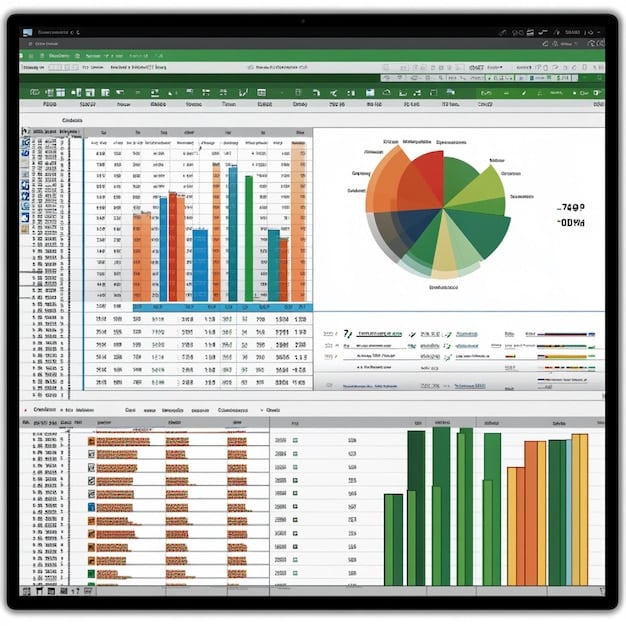Data Analytics for Non-Tech Professionals: Your Path to Success

Data Analytics for Non-Tech Professionals: A Step-by-Step Guide to Future Success provides a comprehensive roadmap for individuals seeking to leverage data in their careers, regardless of their technical background. Learn how to acquire the essential skills and knowledge to thrive in a data-driven world.
Are you a non-tech professional feeling the pressure to understand and utilize data in your role? You’re not alone. The demand for data literacy is skyrocketing across all industries, making data analytics for non-tech professionals a crucial skill for future success.
This step-by-step guide will equip you with the knowledge and confidence to navigate the world of data, empowering you to make informed decisions and contribute meaningfully to your organization. Let’s embark on this journey to unlock your data potential!
Understanding the Importance of Data Analytics
In today’s business environment, data is king. Companies are increasingly relying on data to make strategic decisions, understand customer behavior, and optimize their operations. This makes data analytics for non-tech professionals: a step-by-step guide to future success not just useful, but essential.
But what exactly is data analytics, and why should non-tech professionals care?
What is Data Analytics?
Data analytics involves examining raw data to draw conclusions about that information. It utilizes various techniques and processes to uncover patterns, trends, and insights that can inform decision-making.
Why is Data Analytics Important for Non-Tech Professionals?
Here’s why data analytics skills are becoming vital for professionals outside of traditional tech roles:
- Improved Decision-Making: Data-driven insights lead to more informed and effective decisions.
- Increased Efficiency: Identify areas for improvement and optimize processes for better results.
- Enhanced Communication: Communicate findings and recommendations more effectively with data visualizations.
- Career Advancement: Develop a highly sought-after skill set that can open doors to new opportunities, by understanding the principles of data analytics for non-tech professionals.
Ultimately, understanding and applying data analytics principles can significantly enhance your ability to contribute to your organization’s success. The core concept of data analytics for non-tech professionals focuses on translating complex data into actionable insights.

Essential Data Analytics Skills for Non-Tech Professionals
While you don’t need to become a data scientist, acquiring a foundational understanding of key data analytics skills is crucial. These skills will empower you to interpret data, ask the right questions, and contribute meaningfully to data-driven discussions. Let’s explore those essential skills for excelling in data analytics for non-tech professionals: a step-by-step guide to future success.
So, what skills are most important for non-tech professionals to develop?
Data Literacy
Data literacy is the ability to understand, interpret, and work with data. This includes being able to identify different types of data, understand basic statistical concepts, and interpret data visualizations. Gaining a good grasp of this skill will open doors for non-tech professionals looking to leverage data analytics.
Data Visualization
Being able to present data in a clear and compelling way is essential for communicating insights to others. Data visualization tools like Tableau and Power BI can help you create charts, graphs, and dashboards that effectively convey your findings.
Basic Statistics
While you don’t need to be a statistician, understanding basic statistical concepts like mean, median, mode, and standard deviation is helpful for interpreting data and identifying trends. This understanding helps improve data analytics for non-tech professionals.
Developing these skills will empower you to confidently navigate the world of data and contribute to data-driven decision-making within your organization. With data analytics for non-tech professionals: a step-by-step guide to future success, you’ll be well-equipped to succeed.
Step-by-Step Guide to Learning Data Analytics
Ready to start your data analytics journey? This step-by-step guide provides a practical roadmap for acquiring the skills and knowledge you need to succeed. If you’re aiming for data analytics for non-tech professionals: a step-by-step guide to future success, here’s how to get started:
Follow these steps to build your data analytics skills:
- Identify Your Goals: What do you hope to achieve with data analytics skills? Are you looking to improve decision-making in your current role, or are you seeking a career change?
- Choose Your Learning Resources: Explore online courses, workshops, and books that cater to non-tech professionals. Platforms like Coursera, edX, and DataCamp offer excellent introductory courses.
- Focus on Practical Application: Don’t just passively consume information. Look for opportunities to apply your new skills to real-world projects, be it at work or in personal projects.
- Network with Data Professionals: Connect with data analysts and scientists to learn from their experiences and gain valuable insights.
By following these steps, you can systematically build your data analytics skills and apply them to achieve your goals. Data analytics for non-tech professionals becomes more accessible with structured learning.
Tools and Technologies for Data Analysis
There are numerous tools and technologies available to help you with data analysis, ranging from user-friendly software to programming languages. Selecting the right tools will depend on your specific needs and technical comfort level. Navigating this landscape is crucial for data analytics for non-tech professionals: a step-by-step guide to future success.
Here’s a look at some popular options:
- Microsoft Excel: A fundamental tool for data manipulation, analysis, and visualization.
- Tableau: A powerful data visualization tool that allows you to create interactive dashboards and reports.
- Power BI: Another popular data visualization tool that integrates well with Microsoft products.
- SQL: A programming language used to manage and query data in databases.
As you become more comfortable with data analysis, you may want to explore programming languages like Python or R, which offer more advanced capabilities. Data analytics for non-tech professionals is made easier with the right tools.

Overcoming Challenges in Data Analytics
Learning data analytics can be challenging, especially for non-tech professionals who may feel intimidated by the technical aspects. However, with the right mindset and strategies, you can overcome these challenges and achieve success. Addressing these hurdles is key to mastering data analytics for non-tech professionals: a step-by-step guide to future success.
Here are some common challenges and how to address them:
Lack of Technical Background
Focus on building a foundational understanding of data concepts and tools. Start with beginner-friendly resources and gradually increase the complexity. The beauty of data analytics is how it can easily be broken down.
Data Overload
Start with small, manageable datasets and gradually work your way up to larger and more complex datasets. Focus on asking specific questions and using data to answer them.
Keeping Up with New Technologies
The field of data analytics is constantly evolving, so it’s important to stay up-to-date on the latest tools and techniques. Subscribe to industry newsletters, attend webinars, and participate in online communities.
Remember, persistence and a willingness to learn are key to overcoming challenges in data analytics. With dedication and the right resources, success is within reach. Data analytics for non-tech professionals is attainable with effort.
Applying Data Analytics in Your Career
Once you’ve acquired a solid foundation in data analytics, it’s time to apply your skills to your career. Look for opportunities to use data to solve problems, improve processes, and inform decision-making in your current role. This is where data analytics for non-tech professionals: a step-by-step guide to future success truly shines.
Here are some ways to apply data analytics in different roles:
- Marketing: Analyze website traffic, campaign performance, and customer demographics to optimize marketing strategies.
- Sales: Identify sales trends, track customer behavior, and forecast future sales.
- Human Resources: Analyze employee data to improve recruitment, retention, and employee engagement.
- Operations: Optimize processes, reduce costs, and improve efficiency.
By actively seeking opportunities to apply your data analytics skills, you’ll not only enhance your own performance but also contribute to your organization’s success. This proactive approach exemplifies data analytics for non-tech professionals bringing value.
| Key Concept | Brief Description |
|---|---|
| 📊 Data Literacy | Understand and interpret data effectively. |
| 📈 Data Visualization | Present data clearly via charts and graphs. |
| ⭐ Key Tools | Excel, Tableau, and Power BI are essential. |
| 🎯 Applications | Improve marketing, sales, HR, and operations. |
Frequently Asked Questions
Data analytics empowers better decision-making, increases efficiency, enhances communication, and opens doors to career advancement. It’s a crucial skill in today’s data-driven world.
No, you don’t need a technical degree. Many online courses and resources are designed specifically for non-tech professionals, focusing on practical application over complex theory.
Start with Microsoft Excel, as it’s a fundamental tool for data manipulation and analysis. Then, consider exploring data visualization tools like Tableau or Power BI.
Look for opportunities to use data to solve problems, improve processes, and inform decision-making in your specific area of expertise. Seek out small, manageable projects at first.
Explore online platforms like Coursera, edX, and DataCamp for introductory courses. Also, consider joining online communities and attending webinars to stay updated.
Conclusion
Embracing data analytics for non-tech professionals: a step-by-step guide to future success has become essential in today’s data-driven world. Acquiring data literacy, visualization, and analytical skills can greatly enhance your career prospects and contribute to your organization’s success.
By following the steps outlined in this guide, you can confidently navigate the world of data and unlock your data potential, regardless of your technical background. Start your journey today and empower yourself with the power of data!